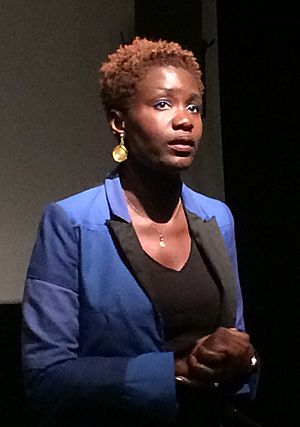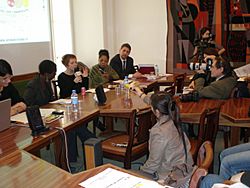Rokhaya Diallo facts for kids
Quick facts for kids
Rokhaya Diallo
|
|
|---|---|

Diallo in 2017
|
|
| Born | 10 April 1978 4th arrondissement of Paris, France
|
| Occupation | Journalist, activist, film-maker |
Rokhaya Diallo (born April 10, 1978) is a French journalist, writer, and filmmaker. She is known for her work fighting for equality for people of all races, genders, and religions. The New York Times has called her one of France's most important anti-racism activists.
Diallo has hosted shows for BET-France and has made documentaries and radio programs. She has written several books, including Racism: a guide, France Belongs to Us, and a children's book called How to talk to kids about racism. She also created a graphic novel and a book called Afro!, which celebrates natural African hairstyles.
Contents
Early Life and Education
Rokhaya Diallo was born in Paris, France, in 1978. Her parents came to France from Senegal and The Gambia. Her father was a mechanic, and her mother was a sewing teacher. In 1989, her family moved to La Courneuve, a suburb of Paris.
After high school, Diallo studied international law and business. She worked for a short time at the technology company IBM. She later earned a degree in marketing from the Panthéon-Sorbonne University in 2003.
In her youth, Diallo was a big fan of anime (Japanese animation) and helped start the Japan Expo festival in France. She also did voice acting for the French versions of the animated films X1999 and Ah! My Goddess: The Movie.
Career and Activism
Diallo's work focuses on making society fairer for everyone. In 2001, she became involved in her local youth council and soon became its president. She also joined groups that fight for women's rights and fair global policies.
In 2020, she began writing for the Global Opinions section of The Washington Post, a major American newspaper. She also became a researcher at Georgetown University in Washington, D.C., and teaches at the Panthéon-Sorbonne University in Paris.
The Indivisibles
In 2006, Diallo started an organization called The Indivisibles. She created it because she felt that people in France were often judged by their skin color or where their families came from. She said, "When we were young, my brother and I had never asked ourselves, 'Where do we come from?', until we were asked by others."
The Indivisibles works to stop people from being treated differently because of their appearance or background. In 2009, the group became famous for creating the "Y'a bon Awards." These awards pointed out racist comments made by public figures in a way that used humor to start a serious conversation.
Fighting for Equality
Diallo believes it is important to change how people think about race. She says that the media sometimes focuses too much on a person's skin color or origin. She also speaks out against unfair treatment of Muslims. She has noted that people often talk about secularism (the separation of religion and government) mainly when discussing Islam, which can lead to negative stereotypes.
Work in Media
Diallo has had a long career in journalism, working in newspapers, radio, and television.
Newspapers and Online
Diallo has written for many French magazines and newspapers, such as Libération. She has reported on topics like the Black Lives Matter movement in the United States. She also writes for international newspapers like The Washington Post and The Guardian.
Radio and Podcasts
Since 2009, Diallo has been a regular voice on the French radio station RTL. She has also hosted shows on the station Mouv'. In 2018, she started a popular podcast called Kiffe ta race with Grace Ly, where they discuss issues of race and identity.
Television
From 2009 to 2013, Diallo was a commentator on the morning show La Matinale on Canal+. She also hosted a show called Égaux mais pas trop (Equal but not too much) on the French parliamentary channel. Since 2016, she has hosted a show on the French version of BET, a channel focused on Black culture.
Key Ideas
Diallo's work is guided by several important ideas about fairness and equality.
Anti-Racism
Diallo works to end unfair treatment based on race. She believes that a person's French identity should not be questioned just because they are not white. She is part of an organization called the Center for Intersectional Justice, which studies how different types of discrimination can overlap. For her activism, she has sometimes faced online harassment.
Feminism
Diallo calls herself an "intersectional feminist." This means she believes that different forms of unfairness, such as those based on gender and race, are connected. She argues that the experiences of Black women, Muslim women, and other minority women are often different from those of white women and should be part of the conversation about women's rights.
Some critics have disagreed with her views. However, Diallo continues to argue that feminism should be inclusive and fight for all women. She has said, "I don't see how marking femininity with a veil is more sexist than marking it with high heels or a miniskirt."
Supporting Black Women
In 2012, Diallo co-wrote an article in the newspaper Le Monde after Elle magazine published an article about Black fashion that many found offensive. Her article questioned why major French magazines rarely featured Black women on their covers.
Awards and Recognition
Rokhaya Diallo has received many awards for her work.
- 2012: She won a prize for fighting racism from the organization COJEP.
- 2013: Slate magazine named her the 36th most influential woman in France.
- 2015: Her documentary Steps to Liberty won Best Documentary Film at a festival in Guadeloupe.
- 2016: She was named "Journalist of the Year" at the European Diversity Awards in London.
- 2017: She was the only French person invited to the launch of the Obama Foundation in Chicago.
Filmography
Diallo has directed and produced several documentary films.
- Steps to liberty (2013)
- Les Réseaux de la haine (Networks of Hate) (2014)
- From Paris to Ferguson : guilty of being black (2016)
- Où sont les Noirs ? (Where are the Black people?) (2020)
- Bootyful (2021)
See also
 In Spanish: Rokhaya Diallo para niños
In Spanish: Rokhaya Diallo para niños


